Thomas James Richards, Diaries, Transcript Vol. 4, 9 November 1916 - 31 May 1918 - Part 27
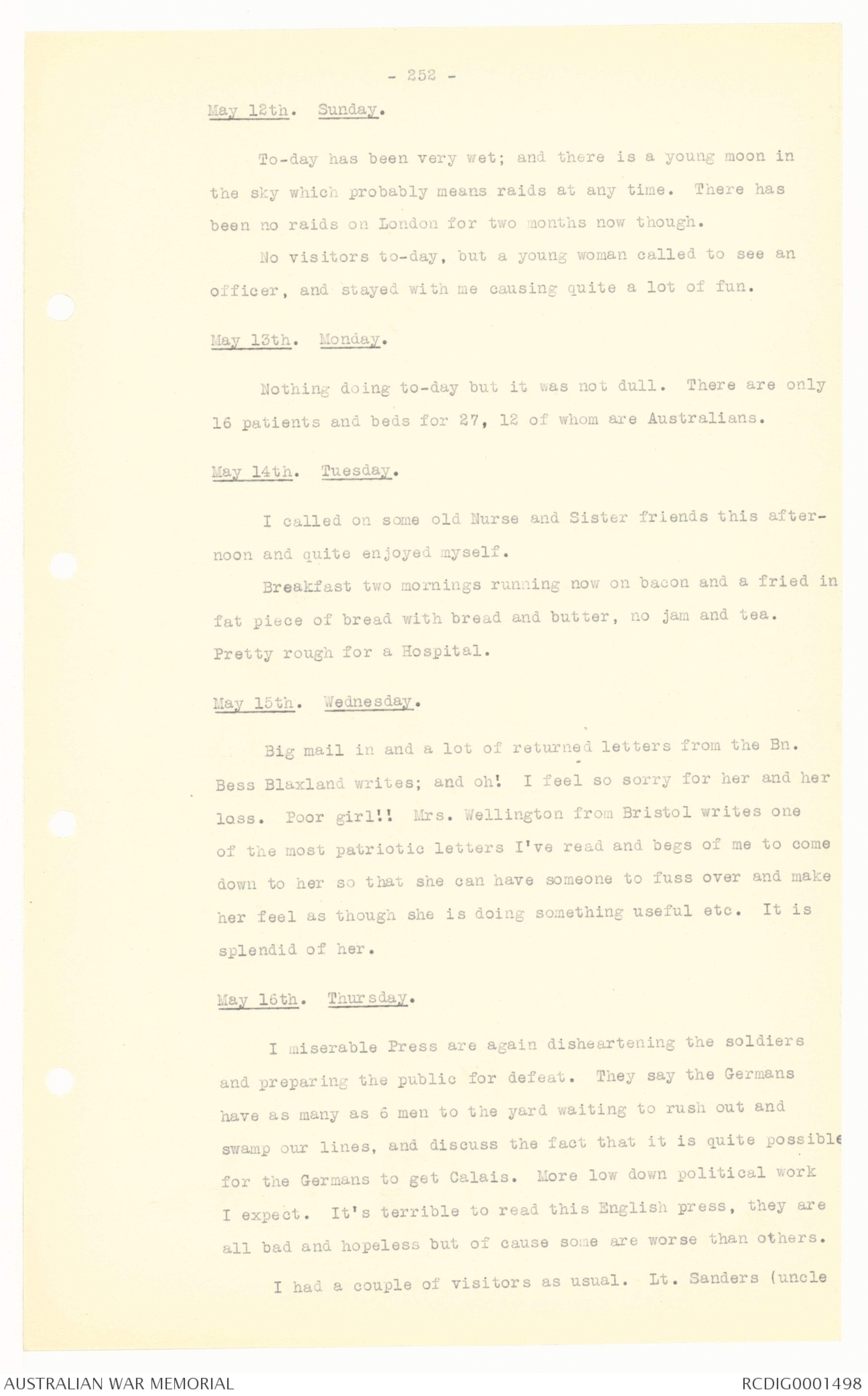
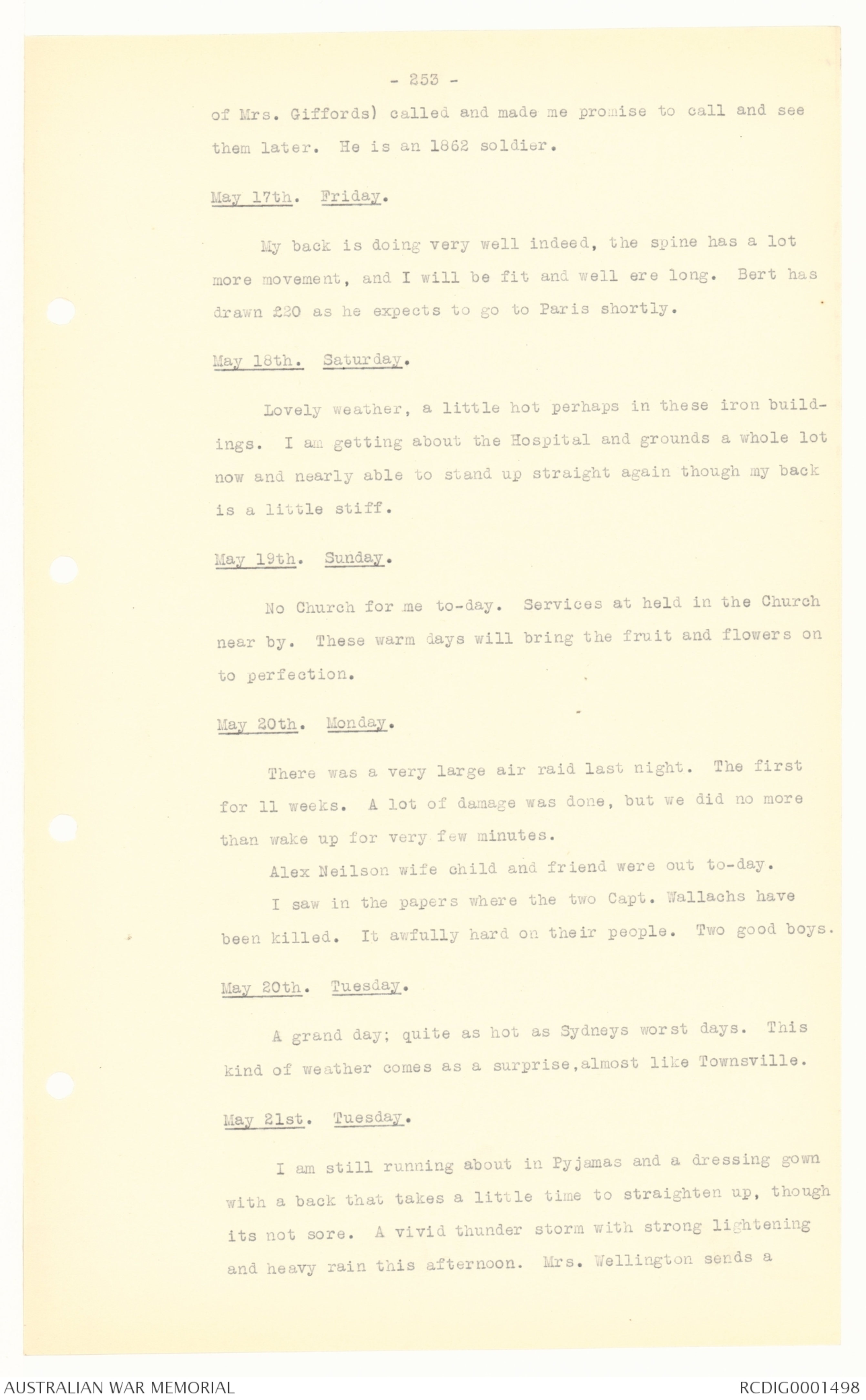
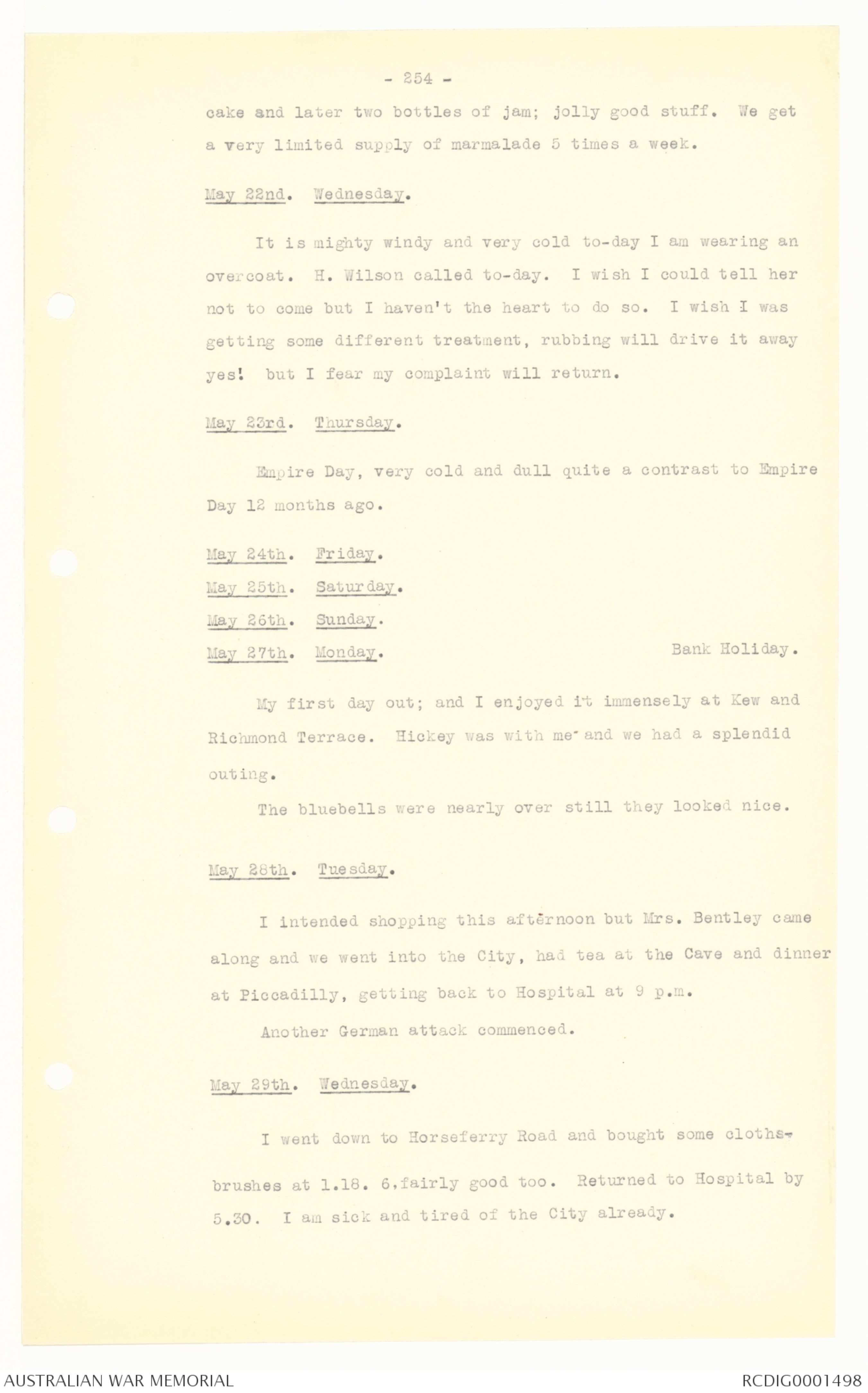
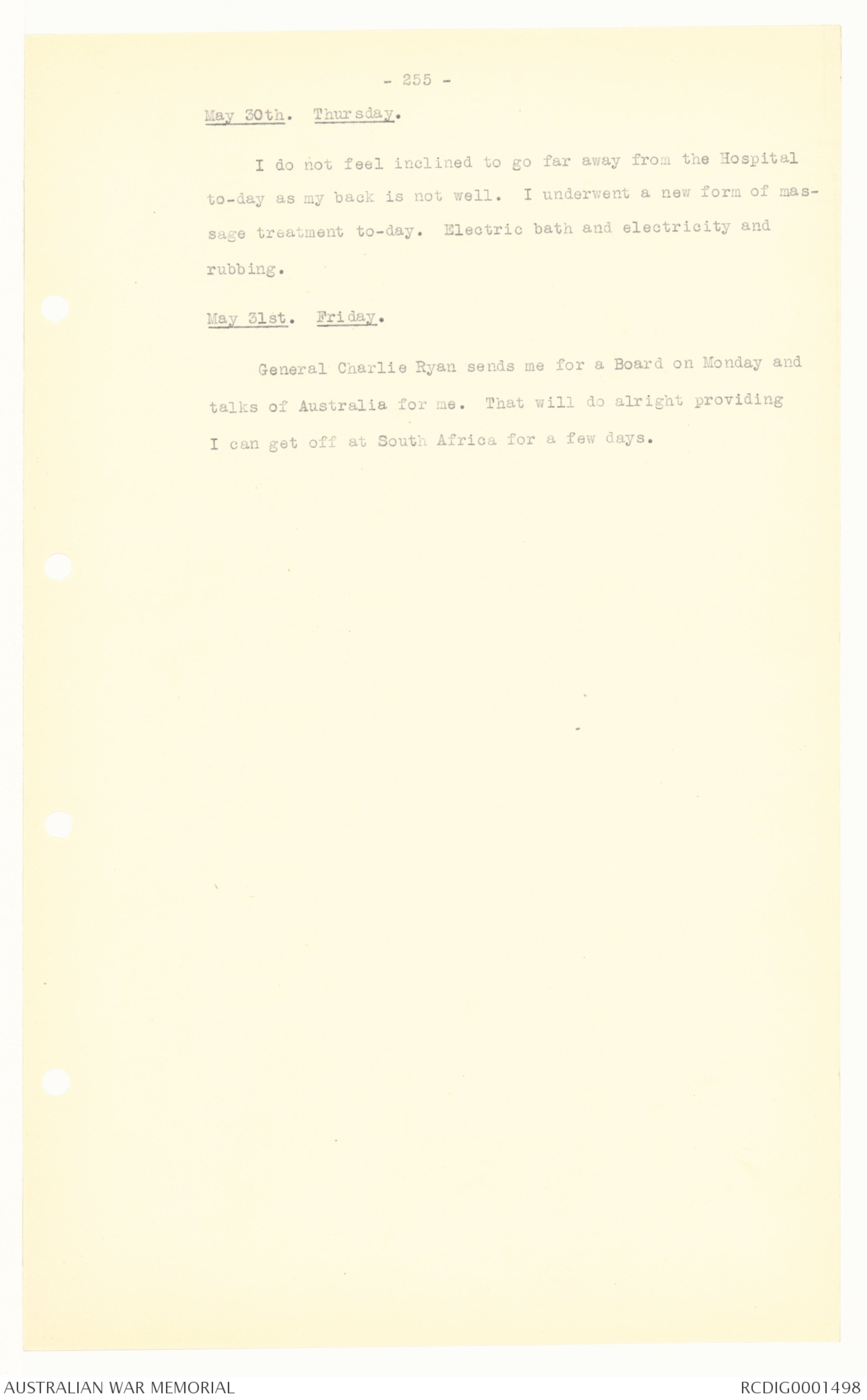
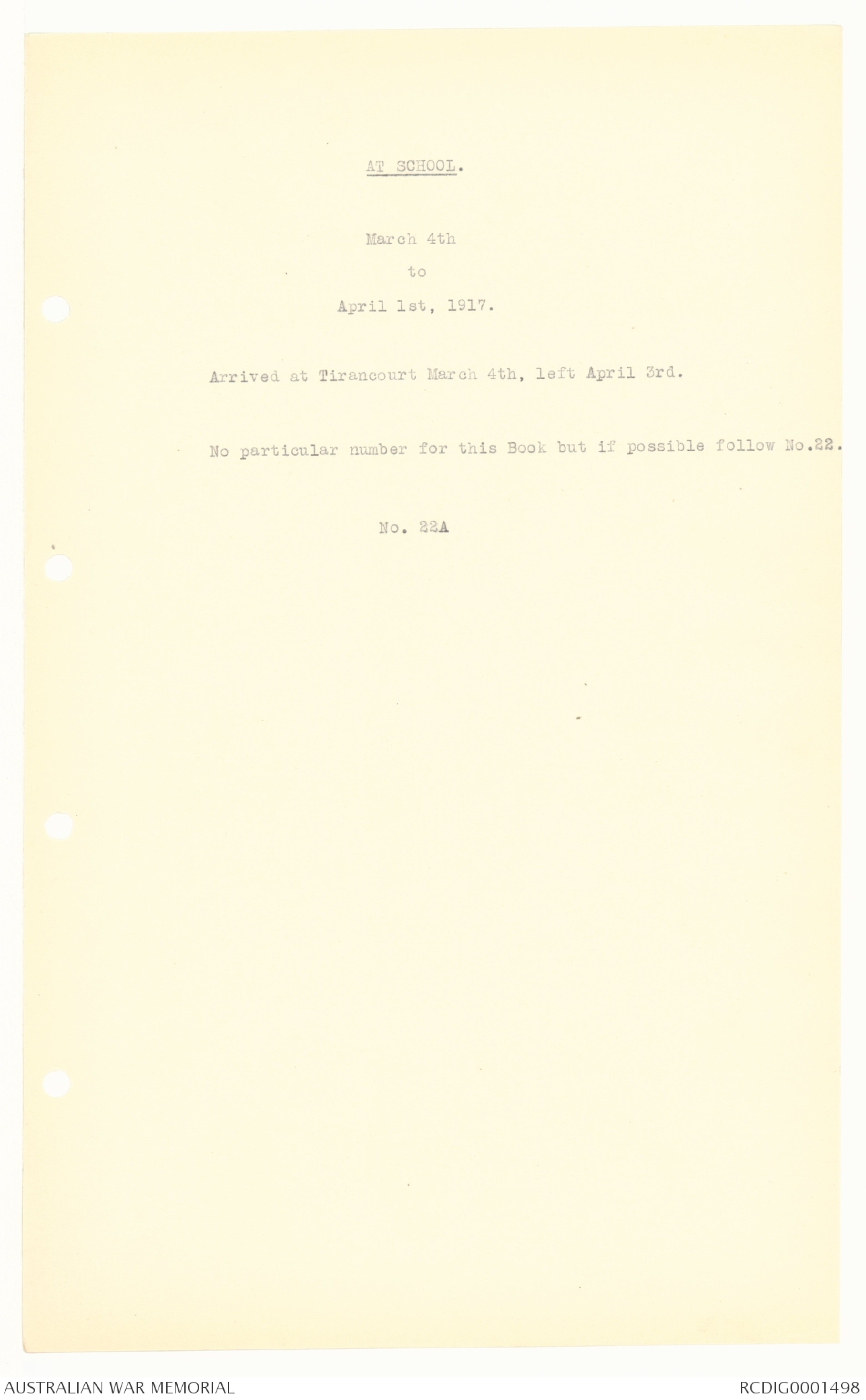
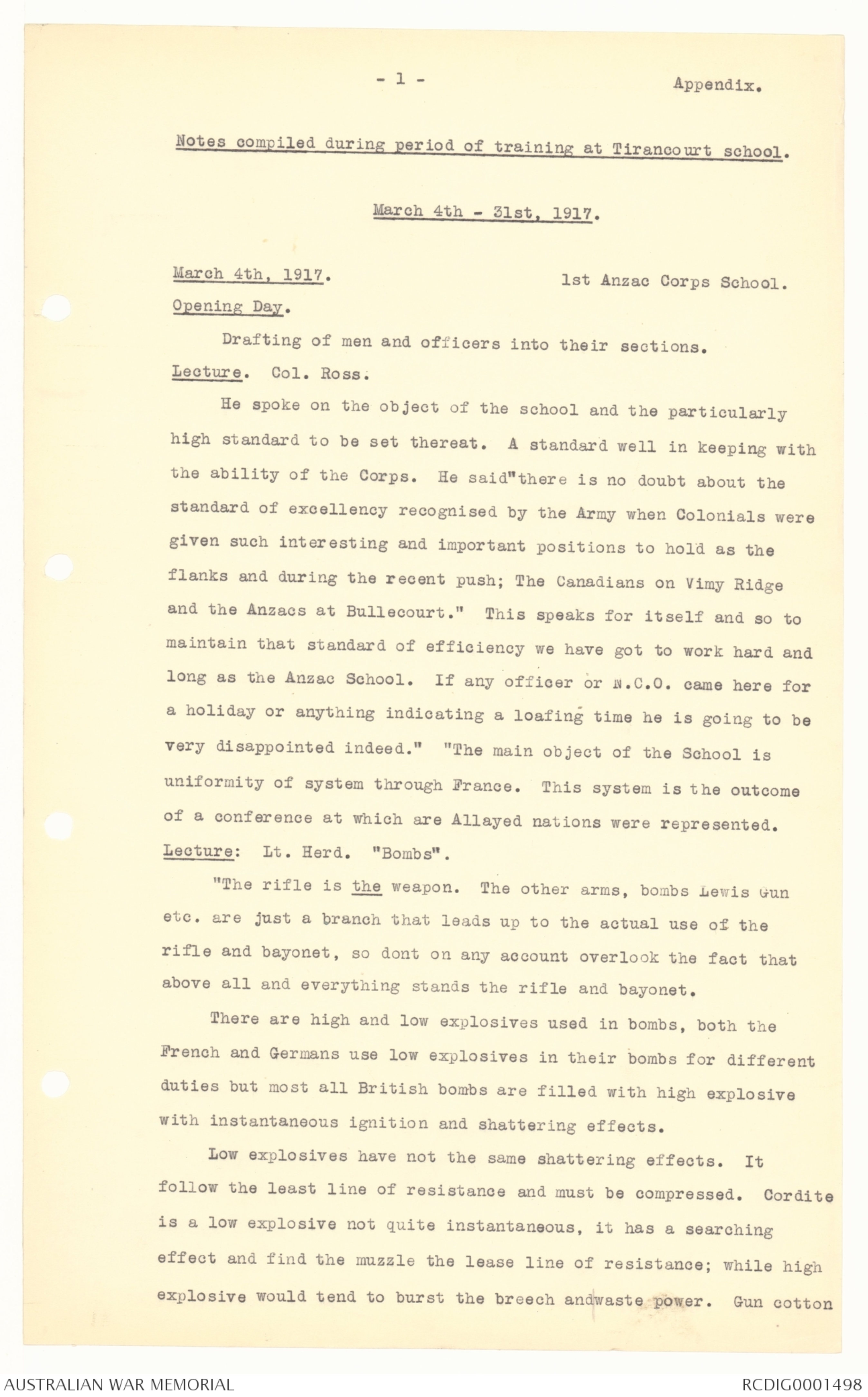
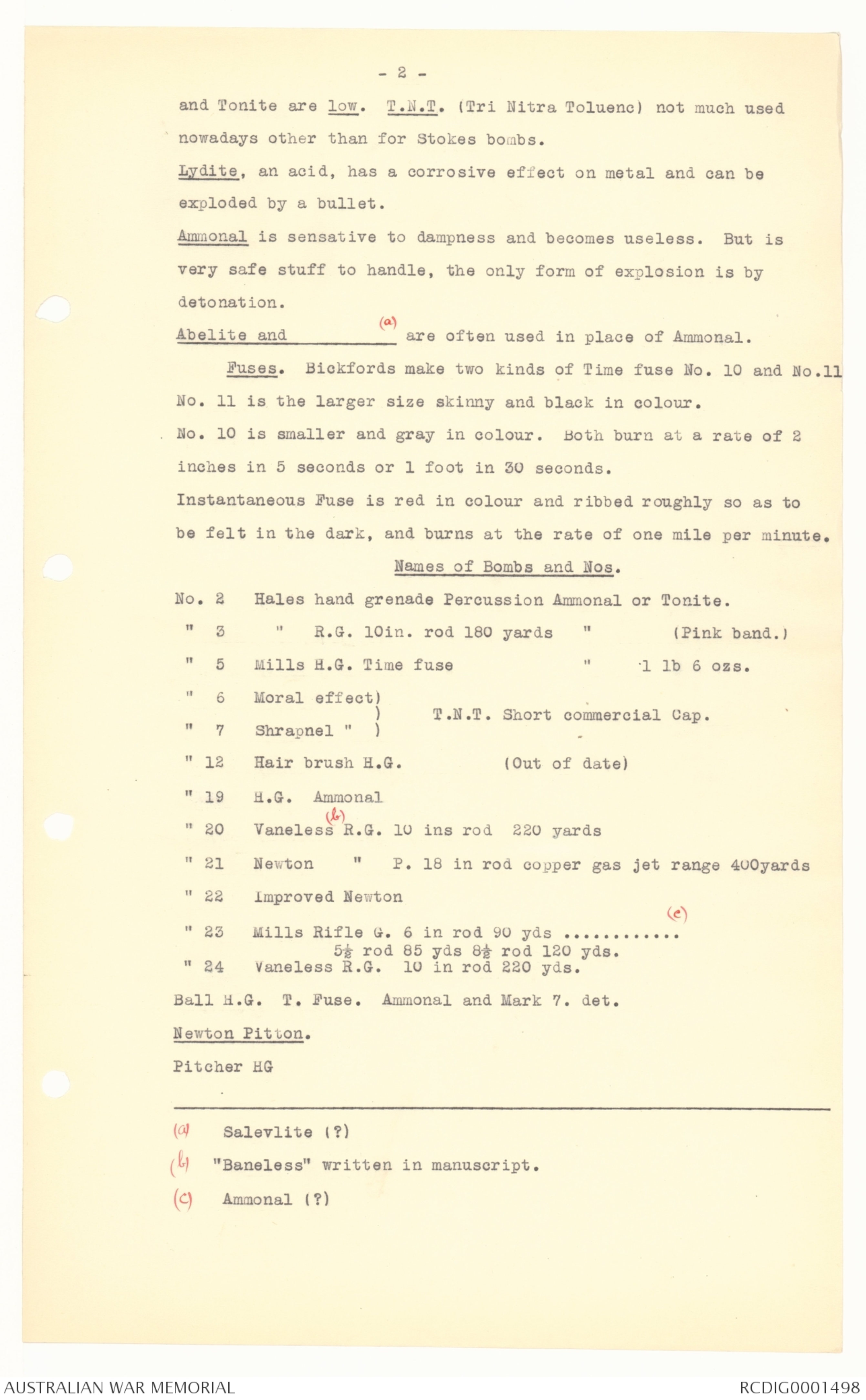
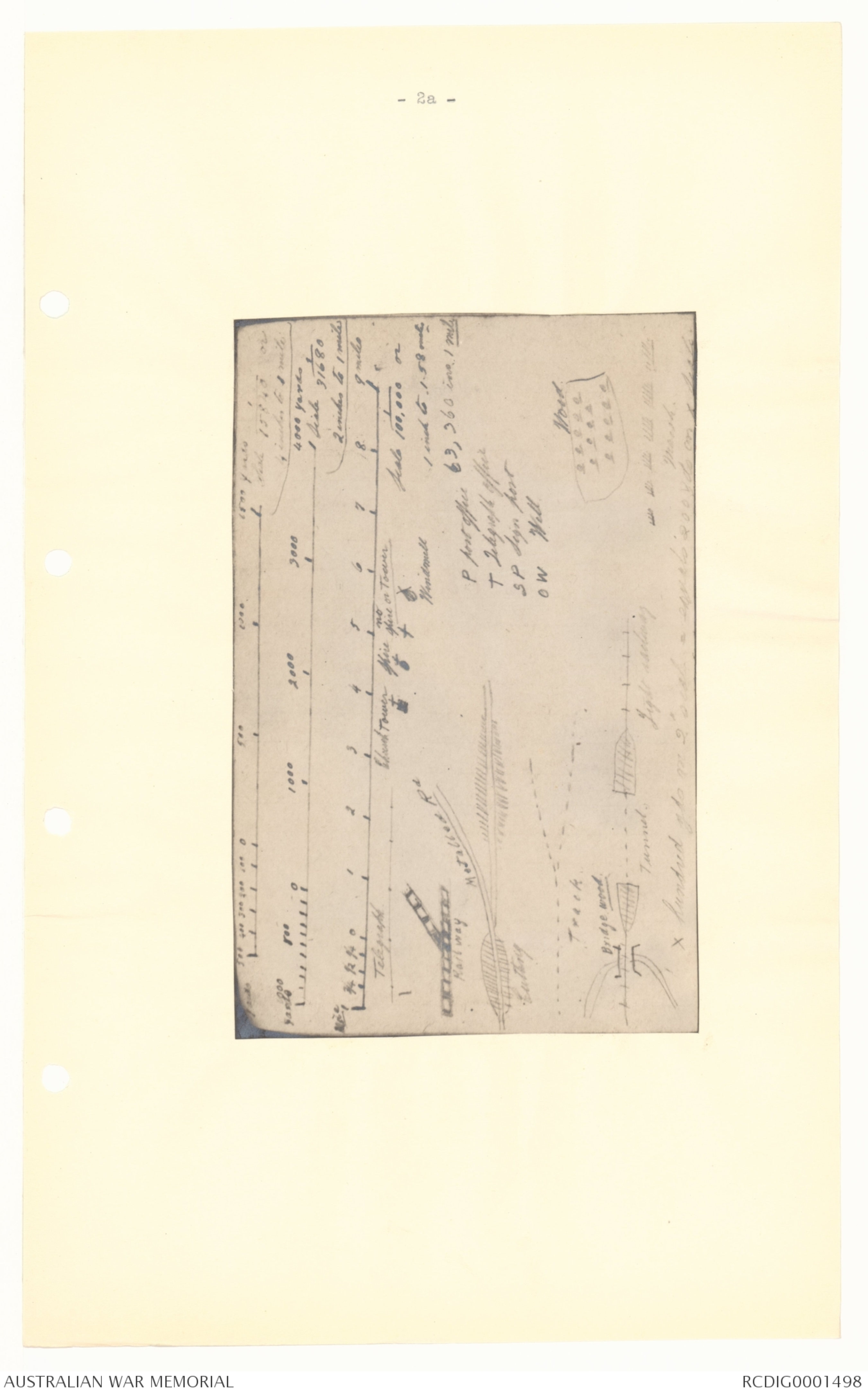
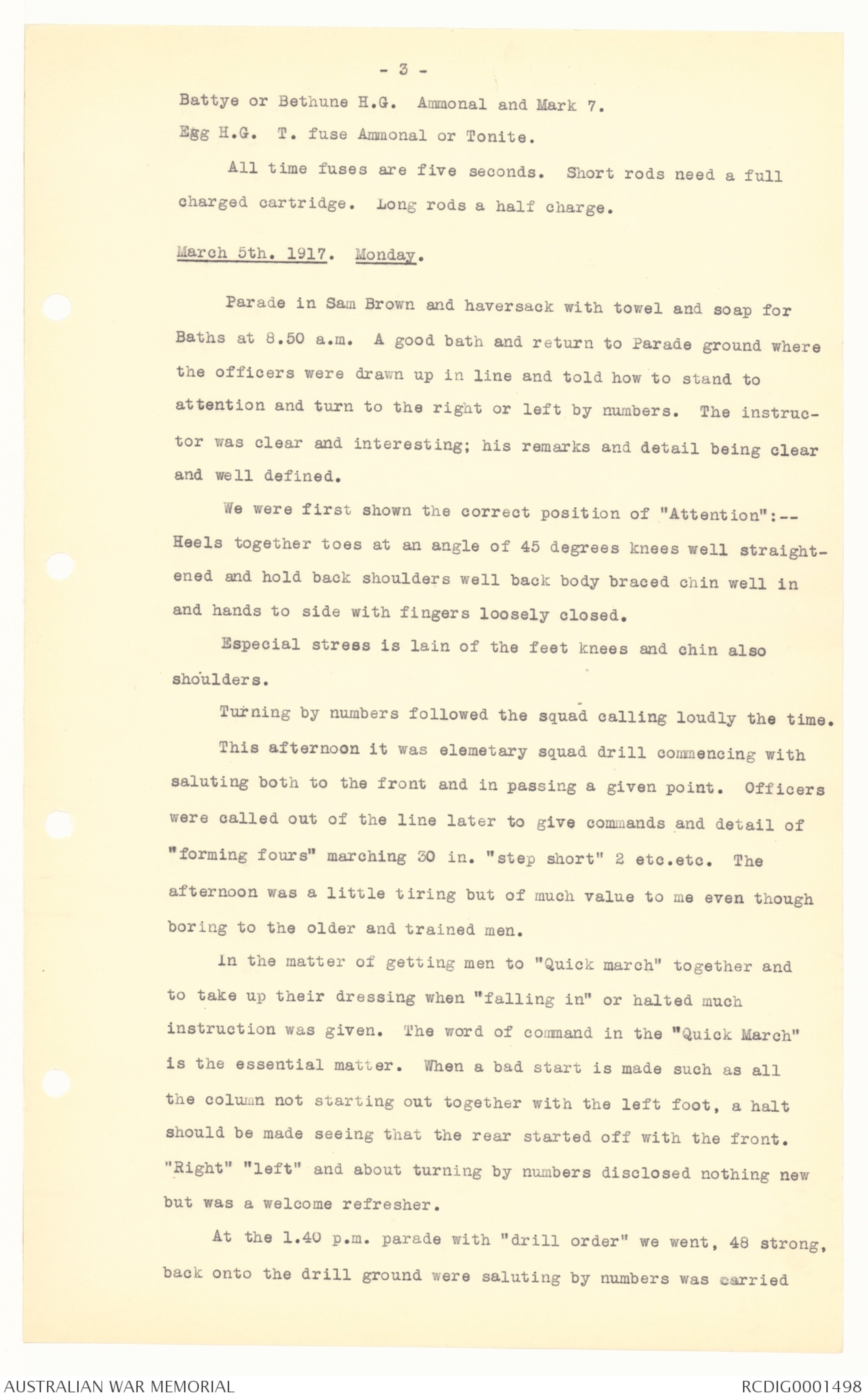
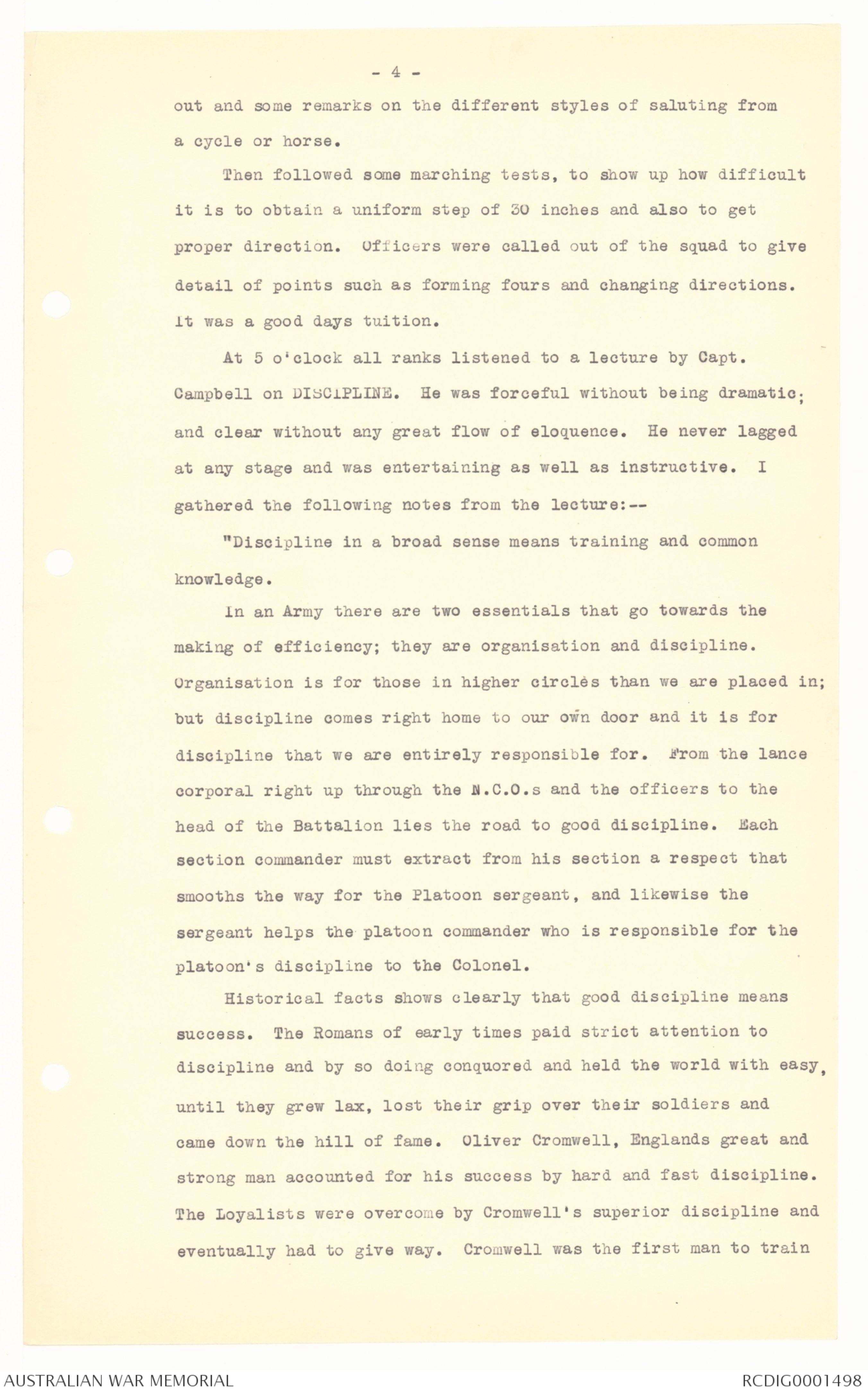
- 252 -
May 12th. Sunday.
To-day has been very wet; and there is a young moon in
the sky which probably means raids at any time. There has
been no raids on London for two months now though.
No visitors to-day, but a young woman called to see an
officer, and stayed with me causing quite a lot of fun.
May 13th. Monday.
Nothing doing to-day but it was not dull. There are only
16 patients and beds for 27, 12 of whom are Australians.
May 14th. Tuesday.
I called on some old Nurse and Sister friends this afternoon
and quite enjoyed myself.
Breakfast two mornings running now on bacon and a fried in
fat piece of bread with bread and butter, no jam and tea.
Pretty rough for a Hospital.
May 15th. Wednesday.
Big mail in and a lot of returned letters from the Bn.
Bess Blaxland writes; and oh! I feel so sorry for her and her
loss. Poor girl!! Mrs. Wellington from Bristol writes one
of the most patriotic letters I've read and begs of me to come
down to her so that she can have someone to fuss over and make
her feel as though she is doing something useful etc. It is
splendid of her.
May 16th. Thursday.
I miserable Press are again disheartening the soldiers
and preparing the public for defeat. They say the Germans
have as many as 6 men to the yard waiting to rush out and
swamp our lines, and discuss the fact that it is quite possible
for the Germans to get Calais. More low down political work
I expect. It's terrible to read this English press, they are
all bad and hopeless but of cause some are worse than others.
I had a couple of visitors as usual. Lt. Sanders (uncle
- 253 -
of Mrs. Giffords) called and made me promise to call and see
them later. He is an 1862 soldier.
May 17th. Friday.
My back is doing very well indeed, the spine has a lot
more movement, and I will be fit and well ere long. Bert has
drawn £20 as he expects to go to Paris shortly.
May 18th. Saturday.
Lovely weather, a little hot perhaps in these iron buildings.
I am getting about the Hospital and grounds a whole lot
now and nearly able to stand up straight again though my back
is a little stiff.
May 19th. Sunday.
No Church for me to-day. Services at held in the Church
near by. These warm days will bring the fruit and flowers on
to perfection.
May 20th. Monday.
There was a very large air raid last night. The first
for 11 weeks. A lot of damage was done, but we did no more
than wake up for very few minutes.
Alex Neilson wife child and friend were out to-day.
I saw in the papers where the two Capt. Wallachs have
been killed. It awfully hard on their people. Two good boys.
May 20th. Tuesday.
A grand day; quite as hot as Sydneys worst days. This
kind of weather comes as a surprise, almost like Townsville.
May 21st. Tuesday.
I am still running about in Pyjamas and a dressing gown
with a back that takes a little time to straighten up, though
its not sore. A vivid thunder storm with strong lightening
and heavy rain this afternoon. Mrs. Wellington sends a
- 254 -
cake and later two bottles of jam; jolly good stuff. We get
a very limited supply of marmalade 5 times a week.
May 22nd. Wednesday.
It is mighty windy and very cold to-day I am wearing an
overcoat. H. Wilson called to-day. I wish I could tell her
not to come but I haven't the heart to do so. I wish I was
getting some different treatment, rubbing will drive it away
yes! but I fear my complaint will return.
May 23rd. Thursday.
Empire Day, very cold and dull quite a contrast to Empire
Day 12 months ago.
May 24th. Friday.
May 25th. Saturday.
May 26th. Sunday.
May 27th. Monday. Bank Holiday.
My first day out; and I enjoyed it immensely at Kew and
Richmond Terrace. Hickey was with me and we had a splendid
outing.
The bluebells were nearly over still they looked nice.
May 28th. Tuesday.
I intended shopping this afternoon but Mrs. Bentley came
along and we went into the City, had tea at the Cave and dinner
at Piccadilly, getting back to Hospital at 9 p.m.
Another German attack commenced.
May 29th. Wednesday.
I went down to Horseferry Road and bought some cloths-brushes
at 1.18. 6, fairly good too. Returned to Hospital by
5.30. I am sick and tired of the City already.
- 255 -
May 30th. Thursday.
I do not feel inclined to go far away from the Hospital
to-day as my back is not well. I underwent a new form of massage
treatment to-day. Electric bath and electricity and
rubbing.
May 31st. Friday.
General Charlie Ryan sends me for a Board on Monday and
talks of Australia for me. That will do alright providing
I can get off at South Africa for a few days.
AT SCHOOL.
March 4th
to
April 1st, 1917.
Arrived at Tirancourt March 4th, left April 3rd.
No particular number for this Book but if possible follow No.22.
No. 22A
- 1 - Appendix.
Notes compiled during period of training at Tirancourt school.
March 4th - 31st, 1917.
March 4th, 1917. 1st Anzac Corps School.
Opening Day.
Drafting of men and officers into their sections.
Lecture. Col. Ross.
He spoke on the object of the school and the particularly
high standard to be set thereat. A standard well in keeping with
the ability of the Corps. He said"there is no doubt about the
standard of excellency recognised by the Army when Colonials were
given such interesting and important positions to hold as the
flanks and during the recent push; The Canadians on Vimy Ridge
and the Anzacs at Bullecourt." This speaks for itself and so to
maintain that standard of efficiency we have got to work hard and
long as the Anzac School. If any officer or N.C.O. came here for
a holiday or anything indicating a loafing time he is going to be
very disappointed indeed." "The main object of the School is
uniformity of system through France. This system is the outcome
of a conference at which are Allayed nations were represented.
Lecture: Lt. Herd. "Bombs".
"The rifle is the weapon. The other arms, bombs Lewis Gun
etc. are just a branch that leads up to the actual use of the
rifle and bayonet, so dont on any account overlook the fact that
above all and everything stands the rifle and bayonet.
There are high and low explosives used in bombs, both the
French and Germans use low explosives in their bombs for different
duties but most all British bombs are filled with high explosive
with instantaneous ignition and shattering effects.
Low explosives have not the same shattering effects. It
follow the least line of resistance and must be compressed. Cordite
is a low explosive not quite instantaneous, it has a searching
effect and find the muzzle the lease line of resistance; while high
explosive would tend to burst the breech and/waste power. Gun cotton
- 2 -
and Tonite are low. T.N.T. (Tri Nitra Toluenc) not much used
nowadays other than for Stokes bombs.
Lydite, an acid, has a corrosive effect on metal and can be
exploded by a bullet.
Ammonal is sensative to dampness and becomes useless. But is
very safe stuff to handle, the only form of explosion is by
detonation.
Abelite and (a) are often used in place of Ammonal.
Fuses. Bickfords make two kinds of Time fuse No. 10 and No.11
No. 11 is the larger size skinny and black in colour.
No. 10 is smaller and gray in colour. Both burn at a rate of 2
inches in 5 seconds or 1 foot in 30 seconds.
Instantaneous Fuse is red in colour and ribbed roughly so as to
be felt in the dark, and burns at the rate of one mile per minute.
Names of Bombs and Nos.
No. 2 Hales hand grenade Percussion Ammonal or Tonite.
" 3 " R.G. 10in. rod 180 yards " (Pink band.)
" 5 Mills H.G. Time fuse "1 1b 6 ozs.
" 6 Moral effect)
) T.N.T. Short commercial Cap.
" 7 Shrapnel " )
" 12 Hair brush H.G. (Out of date)
" 19 H.G. Ammonal
" 20 Vaneless (b) R.G. 10 ins rod 220 yards
" 21 Newton " P. 18 in rod copper gas jet range 400yards
" 22 Improved Newton
" 23 Mills Rifle G. 6 in rod 90 yds .. . . . . . . . . ..(c)
5½ rod 85 yds 8½ rod 120 yds.
" 24 Vaneless R.G. 10 in rod 220 yds.
Ball H.G. T. Fuse. Ammonal and Mark 7. det.
Newton Pitton.
Pitcher HG
(a) Salevlite (?)
(b) "Baneless" written in manuscript.
(c) Ammonal (?)
- 2a -
Hand drawn diagram - see original document
- 3 -
Battye or Bethune H.G. Ammonal and Mark 7.
Egg H.G. T. fuse Ammonal or Tonite.
All time fuses are five seconds. Short rods need a full
charged cartridge. Long rods a half charge.
March 5th. 1917. Monday.
Parade in Sam Brown and haversack with towel and soap for
Baths at 8.50 a.m. A good bath and return to Parade ground where
the officers were drawn up in line and told how to stand to
attention and turn to the right or left by numbers. The instructor
was clear and interesting; his remarks and detail being clear
and well defined.
We were first shown the correct position of "Attention":- -
Heels together toes at an angle of 45 degrees knees well straightened
and hold back shoulders well back body braced chin well in
and hands to side with fingers loosely closed.
Especial stress is lain of the feet knees and chin also
shoulders.
Turning by numbers followed the squad calling loudly the time.
This afternoon it was elemetary squad drill commencing with
saluting both to the front and in passing a given point. Officers
were called out of the line later to give commands and detail of
"forming fours" marching 30 in. "step short" 2 etc.etc. The
afternoon was a little tiring but of much value to me even though
boring to the older and trained men.
In the matter of getting men to "Quick march" together and
to take up their dressing when "falling in" or halted much
instruction was given. The word of command in the "Quick March"
is the essential matter. When a bad start is made such as all
the column not starting out together with the left foot, a halt
should be made seeing that the rear started off with the front.
"Right" "left" and about turning by numbers disclosed nothing new
but was a welcome refresher.
At the 1.40 p.m. parade with "drill order" we went, 48 strong,
back onto the drill ground were saluting by numbers was carried
- 4 -
out and some remarks on the different styles of saluting from
a cycle or horse.
Then followed some marching tests, to show up how difficult
it is to obtain a uniform step of 30 inches and also to get
proper direction. Officers were called out of the squad to give
detail of points such as forming fours and changing directions.
It was a good days tuition.
At 5 o'clock all ranks listened to a lecture by Capt.
Campbell on DISCIPLINE. He was forceful without being dramatic;
and clear without any great flow of eloquence. He never lagged
at any stage and was entertaining as well as instructive. I
gathered the following notes from the lecture:--
"Discipline in a broad sense means training and common
knowledge.
In an Army there are two essentials that go towards the
making of efficiency; they are organisation and discipline.
Organisation is for those in higher circles than we are placed in;
but discipline comes right home to our own door and it is for
discipline that we are entirely responsible for. From the lance
corporal right up through the N.C.O.s and the officers to the
head of the Battalion lies the road to good discipline. Each
section commander must extract from his section a respect that
smooths the way for the Platoon sergeant, and likewise the
sergeant helps the platoon commander who is responsible for the
platoon's discipline to the Colonel.
Historical facts shows clearly that good discipline means
success. The Romans of early times paid strict attention to
discipline and by so doing conquored and held the world with easy,
until they grew lax, lost their grip over their soldiers and
came down the hill of fame. Oliver Cromwell, Englands great and
strong man accounted for his success by hard and fast discipline.
The Loyalists were overcome by Cromwell's superior discipline and
eventually had to give way. Cromwell was the first man to train
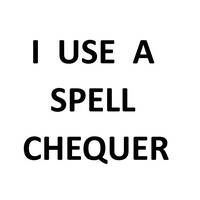 Not Yet Replaced By AI
Not Yet Replaced By AIThis transcription item is now locked to you for editing. To release the lock either Save your changes or Cancel.
This lock will be automatically released after 60 minutes of inactivity.